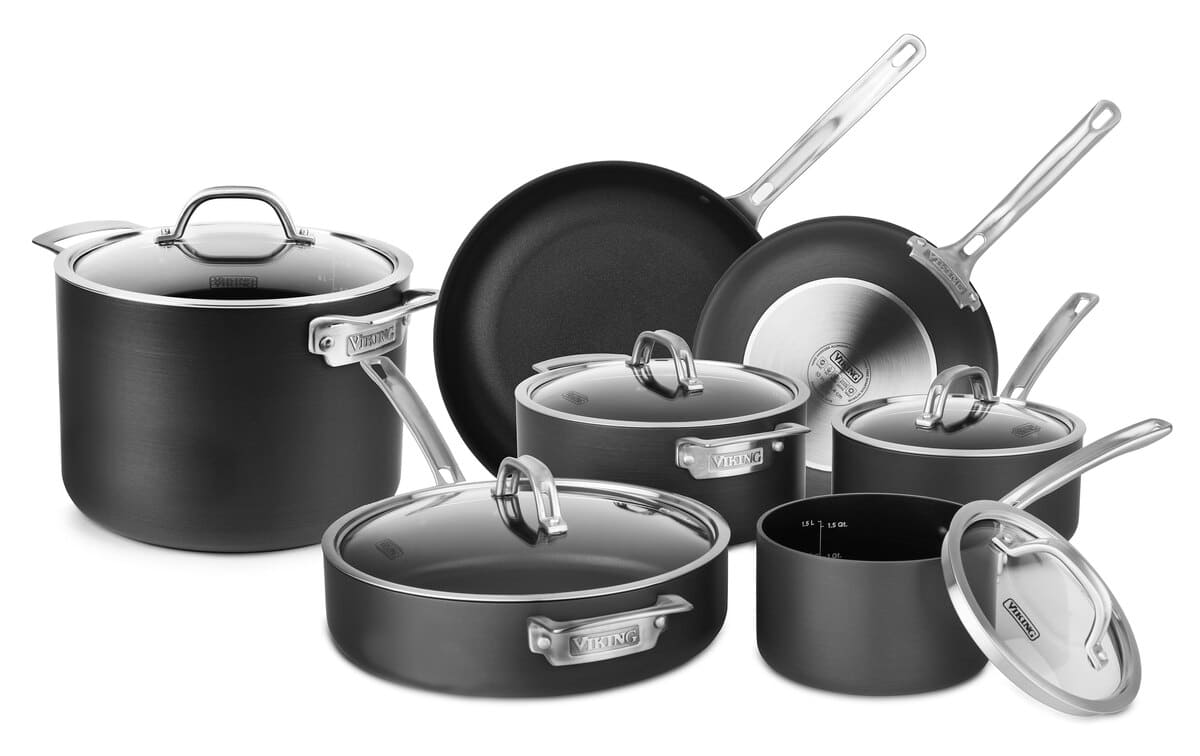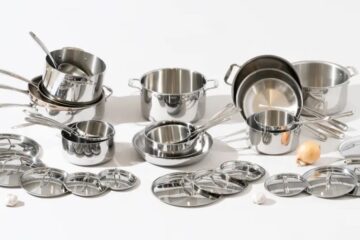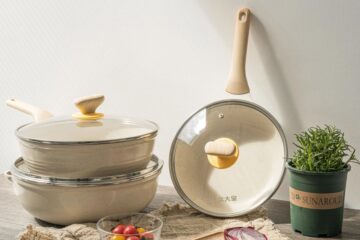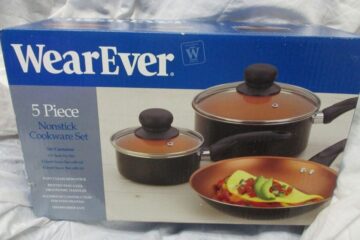Hard anodized cookware has become increasingly popular in recent years due to its durability and non-stick properties. However, some people have raised concerns about the safety of using hard anodized cookware, particularly regarding the risk of cancer.
Many people believe that aluminum cookware can cause cancer, but the reality is more complex. Hard anodized cookware is made by treating aluminum with an electrochemical process that creates a layer of oxide on the surface of the metal. This layer is extremely hard and durable, making the cookware resistant to scratches, dents, and other forms of damage. It also makes the cookware non-reactive, so it won’t interact with acidic or alkaline ingredients in your food.
What is Hard Anodized Cookware?
Hard anodized cookware is a type of cookware that has been treated with an electrochemical process to make it harder and more durable. The process involves immersing the aluminum cookware in a chemical bath and exposing it to a strong electrical current. The result is a hard, non-porous surface that is resistant to scratches and other types of wear and tear.
Hard anodized cookware is known for its ability to distribute heat evenly, making it a popular choice among home cooks and professional chefs alike. It is also non-reactive, which means that it won’t react with acidic foods like tomatoes and citrus fruits. This makes it a great choice for cooking a wide range of dishes, including soups, stews, and sauces.
One of the main benefits of hard anodized cookware is that it is easy to clean. The non-porous surface means that food particles won’t stick to the surface, making it easy to wipe clean with a damp cloth or sponge. It is also dishwasher safe, which makes it a convenient choice for busy households.
Can Hard Anodized Cookware Cause Cancer?
The Potential Health Risks of Aluminum
Aluminum is a lightweight, durable, and inexpensive metal that is commonly used in cookware. However, there have been concerns about the potential health risks of aluminum exposure, including the development of cancer. Some studies have suggested that aluminum may be linked to Alzheimer’s disease, although this connection is still not fully understood.
The Safety of Hard Anodized Cookware
Hard anodized cookware is made by subjecting aluminum to an electrochemical process that creates a hard, non-reactive surface. This process does not change the chemical composition of the aluminum, so it remains non-reactive and won’t interact with acidic or alkaline ingredients in your food. Additionally, hard anodized cookware is coated with safe and non-stick materials, making it a popular choice for many home cooks.
Research suggests that hard anodized cookware is safe to use and does not cause cancer. The metal used in anodized cookware isn’t toxic, and it contains no heavy metals or other dangerous substances. However, it is important to note that cooking with any type of cookware that is scratched, damaged, or corroded can lead to the leaching of metals into food, which can be harmful to health.
The Role of Proper Use and Maintenance
Proper use and maintenance of hard anodized cookware can help to ensure its safety and longevity. Here are some tips to keep in mind:
- Avoid using metal utensils, which can scratch the surface of the cookware and cause it to wear down over time.
- Clean the cookware thoroughly after each use, using a mild detergent and a soft sponge or cloth.
- Avoid using abrasive cleaners or scouring pads, which can damage the surface of the cookware.
- Store the cookware properly, in a dry and cool place, to prevent damage and corrosion.
Alternatives to Hard Anodized Cookware
When it comes to choosing cookware, there are several alternatives to hard anodized cookware that can be considered. Here are some options:
Stainless Steel Cookware
Stainless steel cookware is a popular alternative to hard anodized cookware. It is durable, easy to clean, and does not react with acidic foods. It is also a good conductor of heat and can be used on both gas and electric stovetops.
One of the downsides of stainless steel cookware is that it can be prone to sticking, so it is important to use a non-stick cooking spray or oil when cooking. Additionally, stainless steel cookware can be expensive, so it may not be the best option for those on a tight budget.
Ceramic Cookware
Ceramic cookware is another alternative to hard anodized cookware. It is non-reactive, meaning it does not release harmful chemicals into food. It is also easy to clean and can be used on both gas and electric stovetops.
One of the downsides of ceramic cookware is that it can be prone to chipping and cracking, so it is important to handle it with care. Additionally, ceramic cookware can be expensive, so it may not be the best option for those on a tight budget.
Cast Iron Cookware
Cast iron cookware is a traditional alternative to hard anodized cookware. It is durable, retains heat well, and can be used on both gas and electric stovetops. It is also affordable and can be used in the oven or on the grill.
One of the downsides of cast iron cookware is that it can be heavy and difficult to handle. It also requires seasoning before use and can be prone to rust if not properly cared for.
Conclusion
After researching and analyzing the available information, it can be concluded that hard anodized cookware is generally safe to use and does not cause cancer. The anodization process creates a non-reactive surface that does not interact with acidic or alkaline ingredients in food.
While some people still have concerns about the potential health risks associated with hard anodized cookware, the majority of scientific evidence suggests that it is safe for use in cooking. However, it is important to note that no cookware is completely risk-free and proper care and maintenance should be taken to ensure its longevity and safety.
It is also important to consider other factors that may impact health, such as the quality of the cookware, the cooking methods used, and the overall diet and lifestyle of the individual. Choosing high-quality, non-toxic cookware and practicing healthy cooking habits can help reduce the risk of potential health hazards.
In summary, hard anodized cookware is a popular and durable choice for many home cooks and chefs. While there may be some concerns about its safety, the available evidence suggests that it is generally safe for use in cooking. As with any cooking tool, proper care and maintenance are key to ensuring its safety and longevity.



